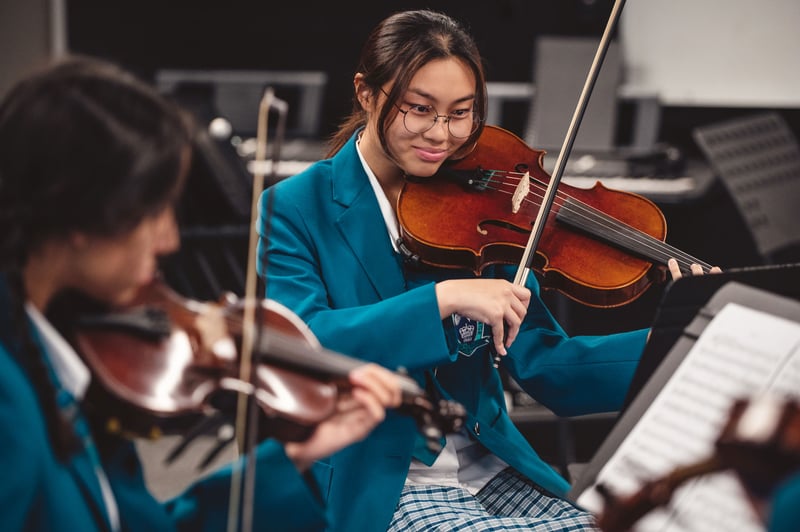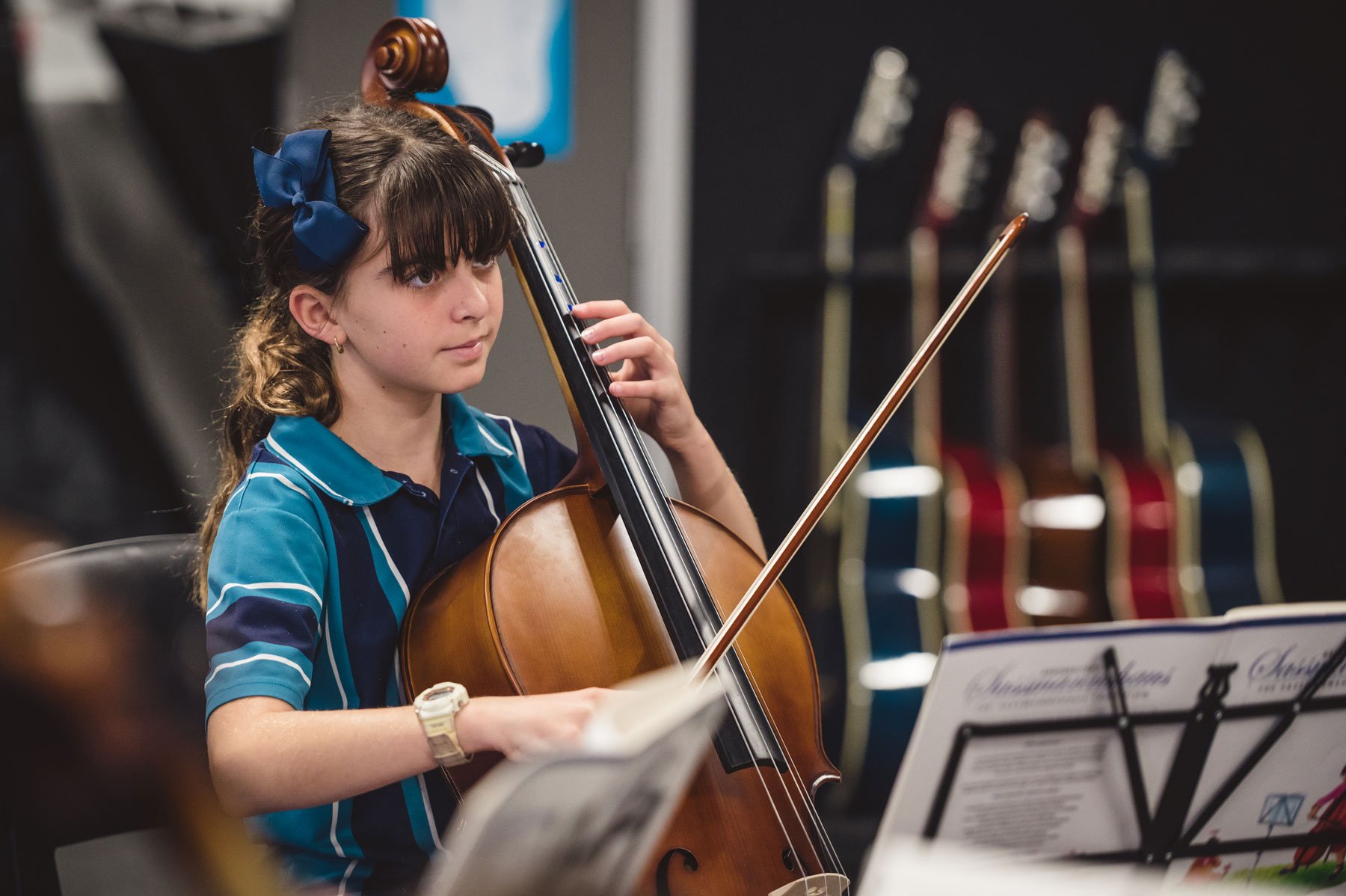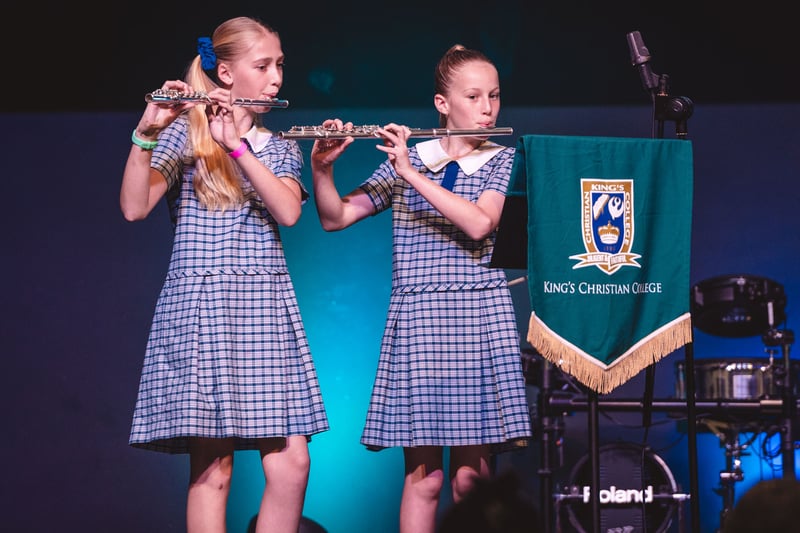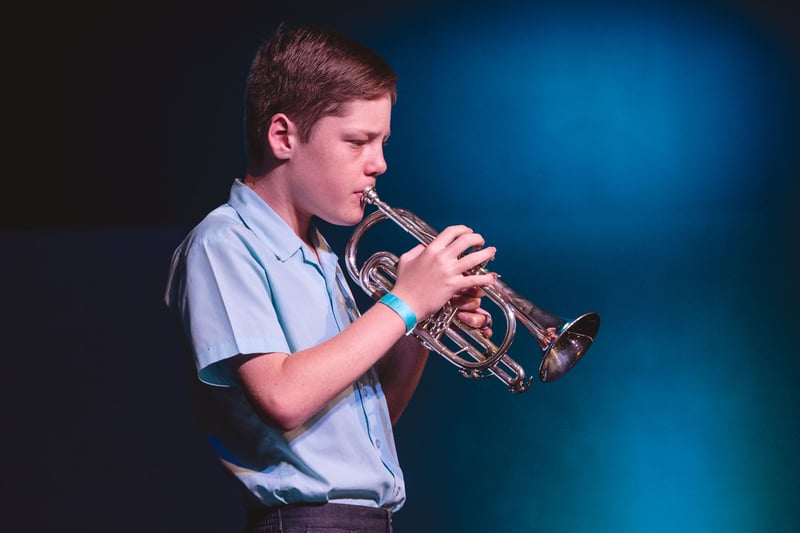
There are so many benefits to learning to play an instrument - it relieves stress, builds confidence, develops reasoning skills and more. But for parents who have never played an instrument themselves, deciding on a first instrument for their child can be a daunting experience.
Conversely, parents who are proficient at music often put their child on the same musical journey, starting their child on the instrument they first learnt to play.
This may be successful - a parent's passion for a particular instrument often rubs off the child - but not if the child has a vastly different temperament or personality. Forcing your child to play an instrument they have no interest in does not lead to a love of music.
So how do you find a first instrument that's right for your child?Good Foundation Instruments
There are a few instruments that provide an excellent foundation for developing your child's understanding and love of music. They also make learning a second instrument much easier:
Voice
Often overlooked because it is so obvious but your child's voice is the first instrument they can play. Better still, it's free! Singing solo or in a choir can teach children pitch, tone, melody and harmony. It develops breathing technique and lung capacity that will be useful for wind instruments later on, and helps them develop an ear for music.
Violin
Violins are available in a whole range of sizes, which makes them viable instruments even for very small children. The violin has no frets or keys, which allows children to focus on the sounds the instrument produces. This helps them learn to play in tune and develop an ear for pitch and sound. Bowing develops their understanding of musical phrasing.
Piano
This is such a great instrument for children as they can see clearly - via the black and white keys in front of them - how notes relate to each other. They can spot musical patterns, 'see' which notes harmonise with others and play multiple notes at the same time. This advances their understanding of musical theory. The piano is also one of the few instruments where you can play the melody and harmony simultaneously (ie play a different tune with each hand at the same time). It develops finger strength, which is important for all second instruments.

Important Considerations When Choosing an Instrument:
Your Child's Age
Yes, there are some child prodigies who master an instrument before the age of five ... but these really are the exception.
Most little children lack the concentration, comprehension and physical development for formal music instruction but the early years are a great time to explore and develop a love of music.
As your child gets older, there are still physical and developmental factors you will need to consider when choosing an instrument, such as:
- height
- muscle development
- finger length and span
- fine motor skills
- ability to listen and follow instructions
- dental development (Are they still whistling through missing milk teeth, for example? Is their mouth too small or large for a particular mouthpiece?)
- lung and breath development
This doesn't mean that your child will never be able to play the tenor saxophone, just that they might have to wait a few years before they start on that one.
Here is a rough guide to what instruments are suitable for children, by age:
| Age | Suitable instruments |
| Under 6 | Singing, simple percussion, piano, violin, recorder |
| 6-8 | Singing, piano, violin, cello, flute, clarinet, recorder, guitar, ukelele. |
| 8-9 | This is a good age for starting 'band instruments': woodwind, brass, percussion. Flute, clarinet, alto saxophone, trumpet, trombone, euphonium, French horn, violin, cello , piano, ukelele, guitar, recorder |
| 10+ | Children are usually big enough for the tuba (which is larger than the euphonium), tenor and baritone saxophone, all strings (double bass only for taller children). Violin, cello, viola, double bass (tall students), flute, clarinet, saxophone (alto, tenor, baritone), oboe, bassoon, trumpet, French horn, trombone, euphonium, tuba, percussion, guitar, bass guitar, ukelele. |
Physical Strength
- Larger string instruments - eg double bass and cello, require greater muscle power to be able to hold the instrument and bow it effectively. Many brass instruments - eg euphonium, saxophone - are just too heavy for younger children and the larger percussion instruments call for physical strength and stamina.
- Strong fine motor skills (and fingers) are required for many brass, woodwood and plucking instruments (eg harp, guitar).
- Brass and woodwind instruments require greater lung power - a flute can make novice players dizzy quite quickly and requires a strong breath.

Physical Size of Child
Is the instrument compatible with the body size of the child ... or do they need to wait until they're taller and stronger?
Arm length (think trombones), finger length and span also need to be taken into consideration. For example, a viola player needs longer fingers than a violinist does.
Even the mouth size is important when considering wind instruments.
Before making a decision on a musical instrument, get your child to actually hold the instrument and see how it feels in their hands. Does it feel overpowering or limiting? Uncomfortable or awkward? Or does it feel like a good fit?
It is worth noting that many instruments are available in different sizes (eg guitar, violin, cello, saxophone) and modified versions of some instruments exist - eg a flute with a curved head piece for smaller children, which enables them to play the flute facing forwards and not to the side.
Sensation/Feel
Some children love the vibration they experience under their chin when they play the violin. Others hate it. Energetic children may appreciate the physicality of playing the drums or bowing a large string instrument and would feel restricted sitting down at a static piano. Others might enjoy the slide of a trombone or the weight of an oboe in their hands.
Sound of Instrument
One man's trumpet is another man's bagpipes, to misquote a popular saying. If your child doesn't like the sound of a flute, they are not going to enjoy playing it or find the motivation to practice. We all have different tastes so make sure your child appreciates the sound their instrument produces!
Image
Some instruments just appeal more to certain kids. Maybe they like the idea of carrying a guitar case around or think a saxophone looks particularly cool. If they think a French horn or violin looks or sounds boring, they will be considerably less interested in playing one.

Temperament and Personality
- How much patience and perseverance does your child have? Certain instruments are easier to pick up quickly and make progress with. The four-stringed ukelele is easier than the guitar, for example, and the double bass easier to learn than the cello. And there's always the recorder!
- Do you have a quiet, peaceful child who would be happy practicing the piano, or a boisterous, physical child who would get more out of a trombone or drum set?
- Can your child take instruction well? (If not, avoid string instruments)
- Does your child hanker after an instrument they can sing along with (eg piano, guitar)?
- How sociable is your child? Would they like like to practice and play with others in a school band/orchestra or would they prefer going solo?
Transportation and Storage
Are you happy to be your child's cello slave while they are too small to carry it themselves? Will it fit in your car with all your other stuff?
Do you have room in your house for a piano or drum kit? Tolerant neighbours? Sound proofing?
Will you buy a strong case for that cheap ukelele that's so easy to take with you but so easy to drop?
Expense
This is a very important consideration for most parents. Nobody wants to spend a fortune on an instrument that their child decides they don't want to play after a couple of months. And then there are potential ongoing and maintenance costs, such as:
- annual piano tuning
- replacement strings, bow hair, reeds etc
- cleaning products - eg rosin for bows
- protective cases for transporting instrument
- music lessons
- sheet music/lesson books
Don't spend a lot of money on your child's first instrument - make sure they're going to stick with it before you do so. Try a second hand instrument first.
King's offers an excellent extra-curricular instrumental music program for students from Year 4. The school provides students with an instrument for the first year. Parents do not need to purchase a musical instrument unless their child wishes to continue with it after the first year.
Many music shops offer rental schemes for instruments, which is great idea for a first instrument.
There are also lots of inexpensive musical instruments to get kids started and interested in music, including recorder, ukelele, bongo drums, glockenspiel, electric keyboards. Buy a couple and learn along with your child!
Tips for Parents
- Introduce your children to a wide range of different styles of music and instruments from an early age - recorded music, concerts, street music and busking, play to them yourself if you can.
- Sing to and with your children.
- Encourage your kids to get involved with school choirs and bands, if they are interested.
- Where possible, give them the opportunity to hold, feel and try instruments. Ask musical friends. Visit music shops. Explore, investigate.
- Take them along to events where they can try different musical instruments - eg Bongos at Burleigh Heads on a Sunday evening (free).
- Look into extra-curricular school music programs and clubs where students can try an instrument for a period of time at minimal cost.
- Get advice from your child's school music teacher.
- Make sure your child is interested in playing an instrument before you buy one.
- Don't spend lots of money on your child's first instrument - wait until you are sure they want to continue with it.
- Encourage your kids' passion for music and their chosen instrument. Accompany them on your own instrument, sing along or learn with them! I have recently been learning the ukelele along with my nine-year-old and we are enjoying playing (very) simple duets on the piano together, which he declares is "more fun than playing computer games" (win!!!!).
What if my child changes their mind?
What if they never practice or don't like the instrument you buy them? Don't panic! It happens. Kids are like that. (Adults too!)
They may just not have 'taken' to the instrument or lacked the discipline to practice. Maybe it wasn't the right 'fit' for them ... or just they would rather play soccer. While all children are capable of playing a musical instrument, not all of them will want to.
Even if your child ends up giving up on their instrument, the time they spent learning to play it is not wasted. The skills they have learnt will be transferrable to other instruments, as will the music theory. And there's always eBay ...
Is your child a musician? How did you help them choose their first instrument?
Give us your tips in your comments below.











